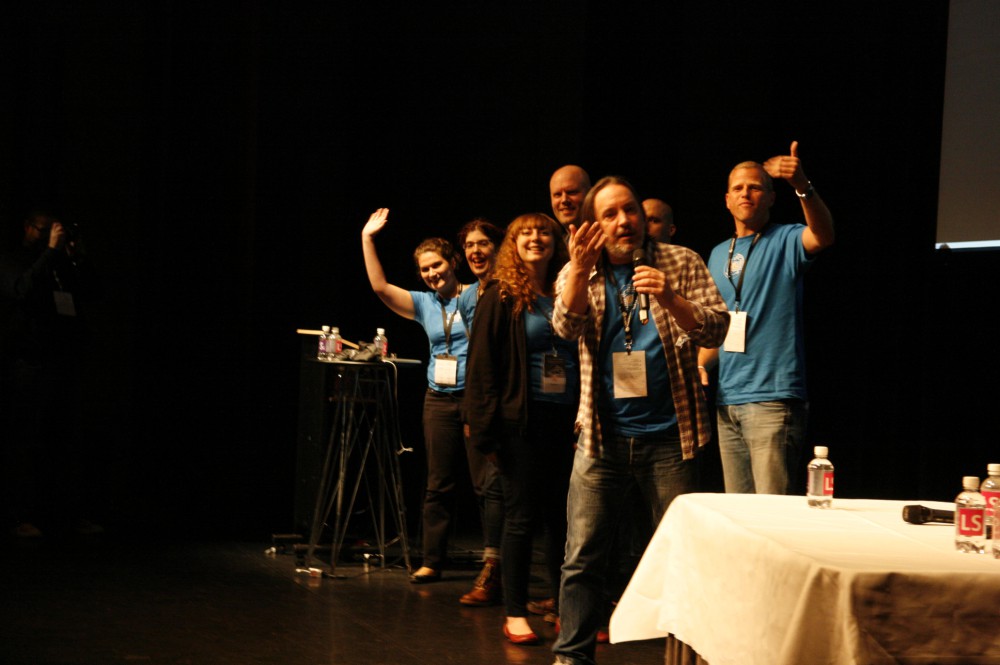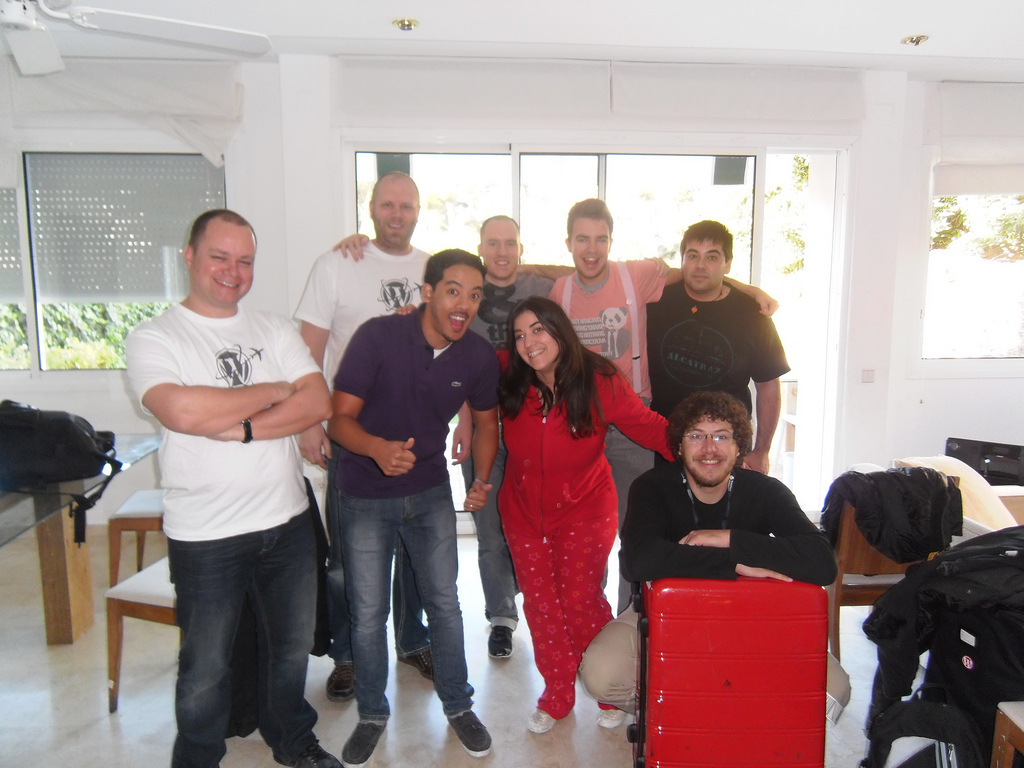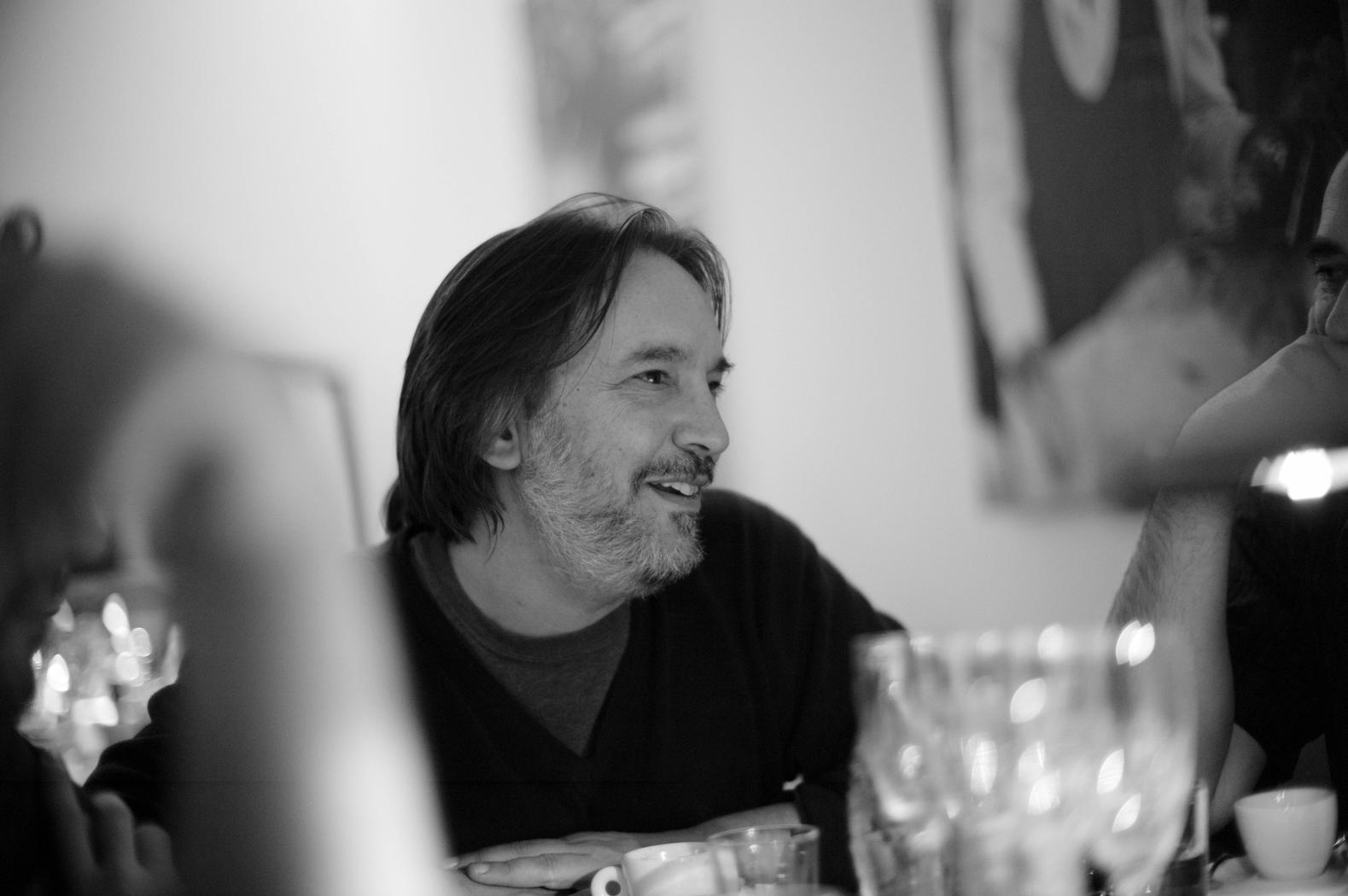The third WordCamp Europe in the history of the world starts on Friday with Zé Fontainhas’ talk on the history of WordCamp Europe. And today, in the last speaker highlight before the event, we would like you to meet Zé.
Zé is a long-time WordPress contributor, WordCamp and meet up organiser and community leader. He’s been an active member of the global WordPress community for the last 10 years, helping contributors from all over the world translate the software in more than 140 languages. Zé is a true Polyglot (speaks five languages proficiently) and a true European. He has spent the last few years working towards creating ties between the European WordPress communities. He led the original WordCamp Europe organising team in 2013 in Leiden and has been a personal inspiration and a mentor for many contributors since.
It was an honour to get to know him better during this interview. I hope you enjoy learning about how he started with WordPress, how he got to contribute, and how the idea of WordCamp Europe was born.
I’m guessing WordPress and you go a long way? How did you get started?
Well, I founded one of the very first web agencies in Lisbon, way back when. We worked almost exclusively with Microsoft stuff (ASP, SQL Server, IIS), and at some point we needed a simple internal communication tool. Enter WordPress-as-the-intranet. This was sometime in 2004 and the version was 1.2. I installed it, it worked fine, and I never gave it another thought.
Fast forward to 2006. I had left the agency by then and was working as an independent web developer. Of course the CMS question popped up again, right in the middle of a project that wasn’t going very well, precisely because of how much I had to fight the CMS. So I switched to WordPress and never looked back.
The first thing I noticed was that the Portuguese translation wasn’t very good, complete, or even maintained. Probably no more than 15% of it was translated, and it was old. Therefore, joining the (now defunct) polyglots mailing list was my next step.
When did the Portugal community get started?
Around that time. You have to understand that the “community” was just me and Américo Dias. Álvaro Góis was number 3 and then Nuno Morgadinho and Ana Aires and many more. Here’s the inception.
So you started contributing to the Portuguese translation. How did you go from there to leading the Polyglots team?
I applied to Automattic at some point, got in, and did a lot of work related to i18n, including support, forum moderator management, and so on (all for WordPress.com), all the while being lead for i18n on WordPress.org.
What are, in your opinion, the most important things that happened for Polyglots in the past few years? What are we still lacking?
Well, that they’re finally seen as daughters and sons of the same gods and not just a development footnote. I don’t think they’re lacking anything these days.
I’ve always been curious about your proficiency in so many languages. How did that happen?
Random life accidents, mostly. First was English: I must’ve been 8 and my mom insisted we go play twice a week with friends of ours, whose mom was English. There was only one rule, which was that we could do whatever we wanted but only in English. So, I got used to it. Never again did I pay attention in English class.
Then we moved to Belgium. Despite the fact that I had consistently flunked French before, I seem to have adapted extremely quickly to the language, just in a few months. Also consider that we are 3 brothers and a sister. In those days, before the end of the first year, we already spoke French to each other exclusively (much to the annoyance of our parents) and kept on doing so for more that 20 years. My sister and I first spoke Portuguese to each other when I was 30 and had to laugh, it was so ridiculous.
From Belgium (and already an anglophile for some reason), where we also had to learn Dutch, we moved to Austria: English school for me, French school for the two younger ones. After a year or so despite having consistently flunked German in Belgium (can you detect a pattern?), I suddenly found out I could actually speak German for some reason. This in turn meant that I couldn’t speak Dutch anymore, they’re too close for me. I can read and understand conversations just fine, but when I open my mouth to speak Dutch, German comes out every time.
Then I came back to Portugal, married an American, had a daughter, and the rest is history. And no, I have no idea why I speak Spanish. I just do.
Do you think speaking languages helped you with your work in Polyglots?
Of course, but not because of the languages themselves: I can’t learn a language without soaking the whole context in – see Belgium, Austria. It gives you a multitude of perspectives.
What’s the most important thing one needs to consider when working with Polyglots?
It’s like diplomacy. You really really really need to be able to listen. Especially when the other person’s culture, vocabulary or background seems to clash with your idea of a civilized conversation. Different cultures have different ways of dealing with manners, schedules, social rituals and so on. It’s not always easy to make sure you’re weighing all that in in a conversation. Of course you need endless patience to deal with everyone who’s not a polyglot involved in i18n.
Tell me a bit about how WordPress Europe came to be? How did you start going to WordCamps outside of Portugal?
Well, it started while I was at Automattic. I seemed to be the natural presence in non-English WordCamps, ambassador of sorts.
When was the idea of WordCamp Europe born?
It had occurred to me and I may have discussed with very few people around 2011 or even as early as 2010. At some WordCamp NL I got to talking with Remkus, and we discovered that we had the same idea. We pitched the idea informally for a bit, and then more formally at the Tybee Community Summit.
Why did you think WordCamp Europe was necessary? As WordCamps are supposed to be local events, how did you decide a pan-continental event would be a good idea?
Because whether we like it or not, Europe is an idea, and it was all over the place at the time, fragmented. No one was talking to anybody else. Germany was doing its own thing, as was France and everybody else. It seemed stupid to travel from Europe to San Francisco (which is clearly not a local event), when we could have a more relevant and significant experience right here. At that time not that many people were travelling to WordCamps, surely not as many as today, and I think WordCamp Europe 2013 is in part responsible for that.
What are the main things WCEU 2013 changed for the European community?
Talking to each other. Suddenly realising the amount and size of projects going on and the amount of skills available. Even finding out that some people who you admire are actually European. A sense of communion, an extension of the whole Erasmus program spirit maybe.

The WordCamp Europe 2013 team
Looking at the third WordCamp Europe in 2015, what would you like to see this year? What should the next goal of WCEU be? To ask in a different way: how should the idea grow?
It’s growing just fine, it seems. Maybe have some other more informal get-togethers, like the defunct WP on Tour. It was supposed to be a co-working week for WordPress people, but it happened just once. And it was also partly responsible for growing the whole WordCamp Europe idea. This was at the end of 2011, but really gained momentum with WP Realm. That was its first physical manifestation. The WP Realm announcement for WordCamp Europe 2013 actually explains a lot.

The WP on Tour crew
Your WordCamp Europe talk is on the history of WordCamp Europe. What can people expect?
It has two parts.
First one is how the WordCamp came to happen, all that happened before, the conversations, the setbacks, the doubts. Stuff which mostly happened while by myself, then WordCaml NL 2011, then WP On Tour, then Tybee, then several other city WordCamps in Europe.
It’ll include the days of WordCamp Europe 2013 themselves and the main conclusions we’ve drawn after that. Taking those conclusions, I’ll offer a personal take on community building in Europe, which has literally exploded after WordCamp Europe 2013. It is wholly personal and is probably a longer take on this post on my blog. I hope to leave some pointers as to what shaping a community from scratch could look like, be it a big one like the European WordPress community or a smaller one.
Zé’s talk How WordCamp Europe Came to Be is on Friday, June 26th, at 9:30am. Don’t miss the opportunity to get his personal take on the event that brought the European community together.
We’ll see you there!

